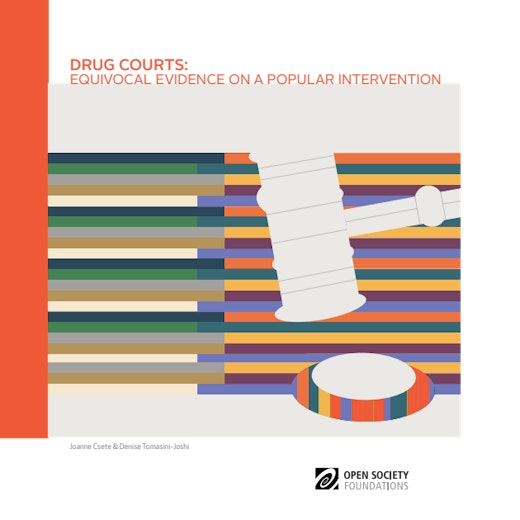A Well-Intentioned, Deeply Flawed Approach to Drug Treatment
By Joanne Csete & Denise Tomasini-Joshi
It seems like a great idea on paper: stop filling prisons with people convicted of minor, nonviolent drug offenses, and instead, put those people into treatment for drug dependence that is overseen by special courts.
In these courts, defense attorneys and prosecutors would drop their usual adversarial roles and work together with judges and other court staff to be a “support team.” By dealing with the addiction, the courts would get at the “root cause” of crime and prevent recidivism, thereby avoiding the high cost of incarceration.
The United States has made drug courts a high priority, both domestically and as a central element of its foreign policy, encouraging other countries to adopt them. But when it comes to how useful or effective drug courts are, the devil truly is in the details. A recent report by the Open Society Foundations, Drug Courts: Equivocal Evidence on a Popular Intervention highlights the points to watch out for.
After 25 years of drug court experience in the United States, a substantial body of evidence suggests that these courts can do more harm than good. First, drug courts should ideally be working very closely with health professionals, who would make medical decisions about the nature and duration of treatment. But many accounts from across the country indicate that drug court judges are often swayed more by their own sometimes uninformed prejudices about treatment than by the views of clinicians.
For instance, although the World Health Organization and every reputable health policy body endorse the benefits of medication-assisted treatment (MAT) for opiate dependence—which uses stabilizing medicines such as methadone and buprenorphine—many judges and drug courts reject this treatment, sometimes calling it, incorrectly, another form of addiction.
Recent years have seen dramatic increases in opiate dependence and opiate overdose-related death and illness in the United States. But rather than encouraging use of the full range of treatment options available to deal with this difficult problem, many drug courts require MAT patients to be “tapered” off treatment, require them to use medications that may not be the most effective for an individual’s medical condition, or simply refuse to include MAT as an option among court-supervised therapies.
Unfortunately, but predictably, this has only resulted in even more overdose deaths as people pushed into the wrong kind of treatment find themselves turning to street opiates.
Another example of clinically misguided decision making by the courts is punishing people for “failing” treatment, often by putting them in prison. Medical authorities refer to drug dependence as a chronic, relapsing condition—most people need to undergo treatment more than once or try several forms of treatment. But, as shown by the research of Prof. Eric Sevigny of the University of South Carolina, drug court judges often impose incarceration as a sanction for “failing” treatment, negating any benefit of diversion from prison for the original offense.
If a health care facility made decisions like these—denied people the correct treatment for their condition or punished them in cruel ways for treatment failure—it could face a medical malpractice claim. But when a judge makes these decisions, there is no such recourse.
In the United States, most courts also require participants to enter a guilty plea as a condition of accessing court-supervised treatment, raising a host of due-process issues. Again, if a judge determines that there has been treatment failure, people might be tossed back into the adversarial system. But with a guilty plea on the record, they can face a longer sentence than if they had rejected drug court and argued a defense.
Most evaluations of U.S. drug courts, many of which are paid for by the same government money that established the courts, suggest that the courts prevent recidivism. But evaluations have been criticized by scholars and independent research agencies as being skewed by the drug courts’ habit of only admitting those most likely to succeed in treatment.
In Latin America, the U.S. is promoting drug courts heavily, including in countries that have already decriminalized personal use of drugs, a move that undermines both efforts to depopulate overcrowded prisons and decriminalization as a more sustainable and human rights–friendly approach to drugs.
The city of Seattle and a few other U.S. cities are embarking on a different approach to minor drug offenses in a program called Law Enforcement Assisted Diversion (LEAD). In LEAD, people charged with minor offenses are diverted to health and social services not requiring a guilty plea and not overseen by courts but by health and social professionals. This program, which has shown early promise, may avert some of the more fiendish pitfalls of drug courts.
Drug courts are likely to be a subject of discussion in the UN General Assembly Special Session on Drugs in April 2016. Delegates to this important meeting should look carefully at the evidence on drug courts to determine whether they are really a step forward or a new variant of the same drug war policies in dire need of reform.
Joanne Csete is a researcher for the Open Society Public Health Program and Global Drug Policy Program.

Until March 2021, Denise Tomasini-Joshi was a division director with the Open Society Public Health Program.


